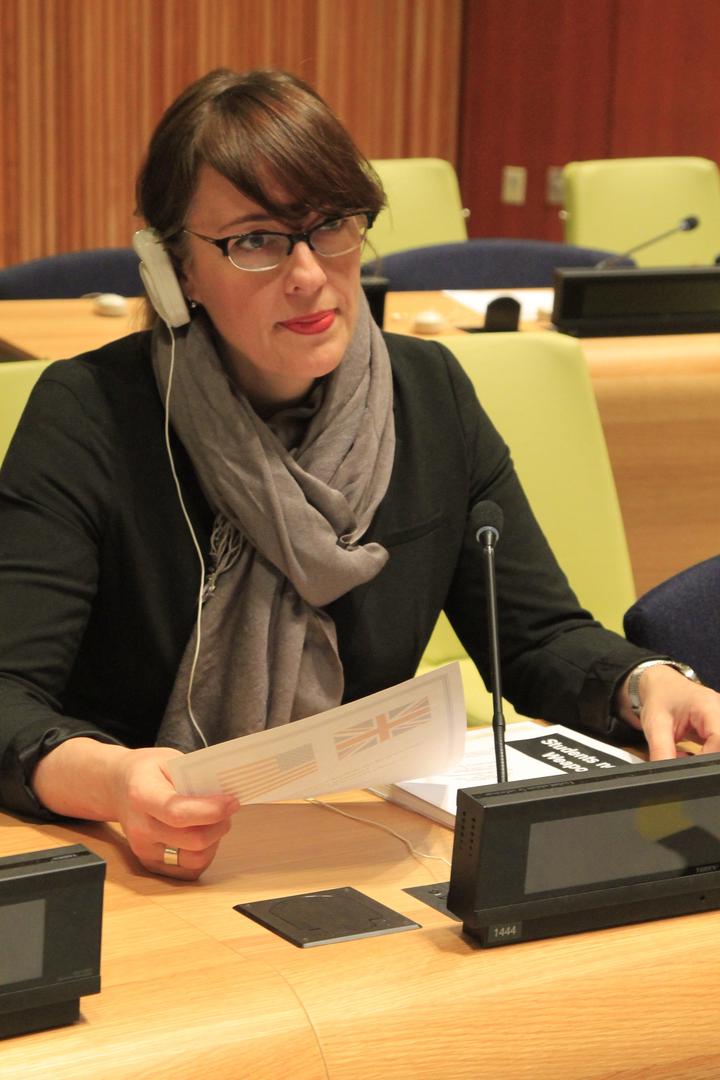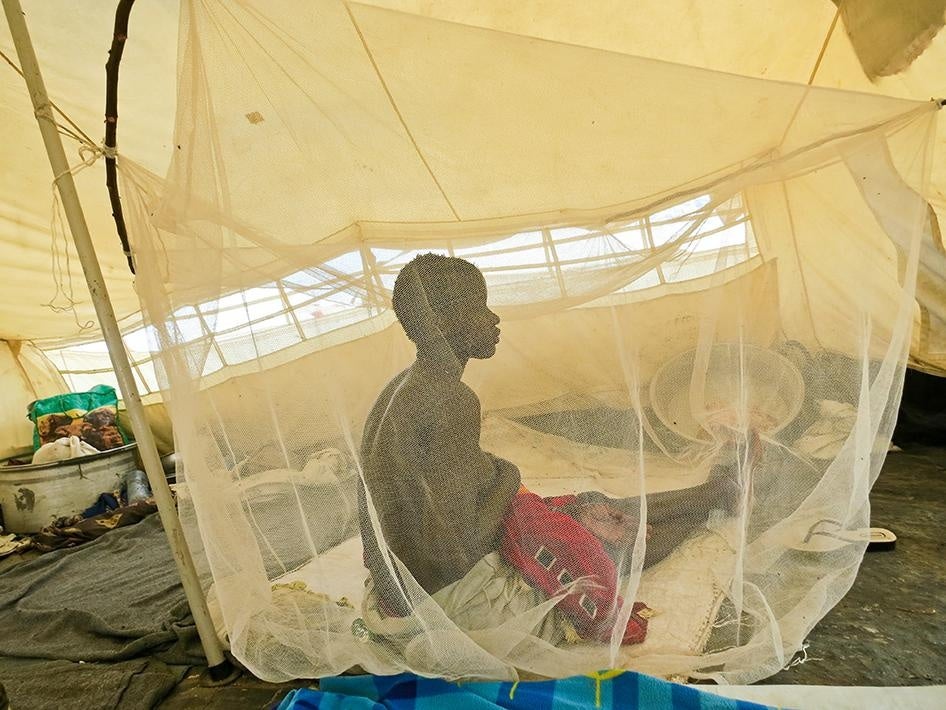Women make up half the population, yet in times of war, in peace talks, and in rebuilding efforts, women are rarely at the table. The issues that impact them and their families – from living safely in camps for the internally displaced to holding rapists accountable – are too rarely made a priority, despite a strong United Nations Security Council Resolution adopted 15 years ago this October that embeds work relating to women, peace, and security into the Council. Human Rights Watch’s Sarah Taylor talks to Amy Braunschweiger about why women’s rights are fundamental to long-term peace and how we can pressure countries to act on this.
How are women’s experiences in armed conflict different from men’s?
The extremist group Islamic State (also known as ISIS) has carried out systematic rape and other sexual violence against Yezidi women and girls in northern Iraq. Human Rights Watch conducted research in the town of Dohuk in January and February 2015, including interviewing 20 women and girls who escaped from ISIS, and reviewing ISIS statements about the subject.
Once you start asking this question, you can see just how wide the impact of conflict is on women and girls.
In conflict, the warring parties may make the assumption that all men are combatants, or potential combatants. They’re often detained and killed based on that assumption. Women are also targeted for many forms of violence. Sometimes it’s rape, but it can also be forced marriage, sexual slavery, forced religious conversion, or the targeting of women activists. The Islamic State (also known as ISIS) kidnapped Iraq’s Yezidi girls and forced them to marry their fighters, and it devastated the Yezidi community. In Nigeria, Boko Haram forced kidnapped Christian schoolgirls to convert to Islam. During the conflicts in the former Yugoslavia, we documented multiple cases where soldiers raped women as part of a policy to “ethnically cleanse” entire communities. Within many cultures, if a baby’s biological father is the enemy, it can tear a community apart. All these attacks can weaken a community and destroy its cohesion and culture. Of course, men are also subjected to sexual violence during a conflict. But it’s women who very much are singled out.
Sometimes governments put women at unnecessary risk. For example, thousands of people have been living in informal settlements for displaced people in Somalia’s capital, Mogadishu, since the 2011 famine. Last March, government forces forcibly evicted 20,000 people from their settlement without warning. Many of these people told Human Rights Watch that the eviction cut them off from water, food, and day labor opportunities. Women were worried about being attacked or even raped by armed men along the route into Mogadishu.
Also, war creates more female-headed households, with men away fighting or in detention. Then, women become breadwinners as well as caregivers. But when laws discriminate against women’s economic rights – by allowing unequal pay, for example – these multiple burdens can be overwhelming.
How do women need to be supported during and after a conflict?
What should be done about this?
Make sure women are involved in camp planning, and take into consideration women’s need for their physical safety. Escorts could accompany women as they gather fuel and firewood. And camps could have civilian liaisons that women could speak to when they feel unsafe – they’d see the early warning signs.
We all need to step it up. Ultimately, we’d like it to be impossible to take any steps on peace and security without integrating women’s rights at their center.
Governments and organizations creating camps or programs should consult with affected communities and let them take part in any decision-making. The government should also be transparent in its decision-making, giving communities feedback. And critics of the government should not face revenge attacks.
What you’re telling me isn’t new information to people working in war zones. Why hasn’t something been done?
This is one of the great frustrations of this issue, as there is a great deal of development at the policy level. And yet, over and over again, when it comes down to specific conflicts, we see the hard work being pushed aside. Funding often isn’t forthcoming. And it’s hard – humanitarian organizations do amazing work in crisis situations, but it’s difficult to provide support for rape survivors in a chaotic setting.
Then, there are the political issues. Governments are often the perpetrators of these crimes, and it’s tough to get them to hold each other accountable. You need look no further than the Security Council to see how politics prevent necessary action. Human Rights Watch has documented terrible rights violations, including mass rape, by the Sudanese government, and yet the Security Council has been unable to take decisive steps, not least because of the stalemate brought on by Sudan supporters, China, and Russia.
Nyanial, 22, nurses one of her three children in the UNMISS camp near Bentiu in June. Soldiers and militia attacked her town in Koch county in May 2015. “We thought that women and children would be safe but we were very wrong… They asked us, ‘where is your beer, your money, and show us any weapons.’ They started beating us. … They burned the tukul. They took our 20 cows.” © 2015 Samer Muscati/Human Rights Watch
But what about instances where the presence of women could scuttle peace talks? Right now, Afghanistan is looking at talks with the Taliban, and I doubt the Taliban would react well to women being at the table.
I don’t think that the vision of a peaceful Afghanistan is dependent on the exclusion of women. I don’t think you can make a legitimate argument that a peaceful future for any country is dependent on the exclusion of half the population. Let’s remember that donor countries and the Afghan government have been excluding Afghan women from peace talks. And actually the Taliban has been willing to talk to women and discuss women’s rights. That doesn’t mean they have changed their horribly oppressive views on women, but they do seem to be willing to talk to them.
When you really look at places where women and respect for their rights have been excluded, I’d argue that it hasn’t worked. No women from the former Yugoslavia were involved in the peace accords, which has likely exacerbated the huge challenges for rape survivors and women who bore children of rape.
But just because there’s good language in a peace agreement, that doesn’t mean it’s implemented. Take Guatemala, where among other atrocities, the government committed genocide against its indigenous population in the 1980s. There was promising language in the 1996 peace accords, including some reflecting international treaties on women’s rights. Yet, after the agreements were signed, there has been little accountability for the mass rapes and killings of women that were part of how the war was waged.
And, just because women are in a peace process, it doesn’t guarantee respect for women’s rights. You need to ensure people who abuse women are prosecuted. You also need judicial reform that embeds women’s rights, and to train judges, prosecutors, and investigators on these issues. Colombia’s peace process over time became more inclusive of women than most other such negotiations. But there are real concerns about the result of those negotiations, including regarding accountability for violations of women’s rights, particularly as gender-based violence has been characteristic of Colombia’s long conflict. In the September 23, 2015 agreement between the Colombian government and the Revolutionary Armed Forces of Colombia (FARC-EP) guerrillas, in exchange for confessions, those who committed war crimes may escape prison. The question also remains as to whether victims will receive the support services they need.







